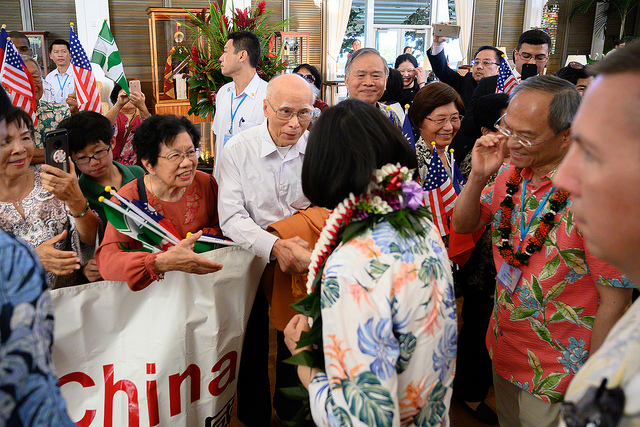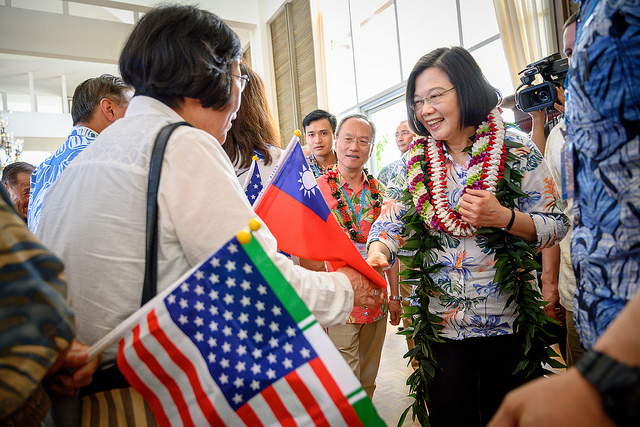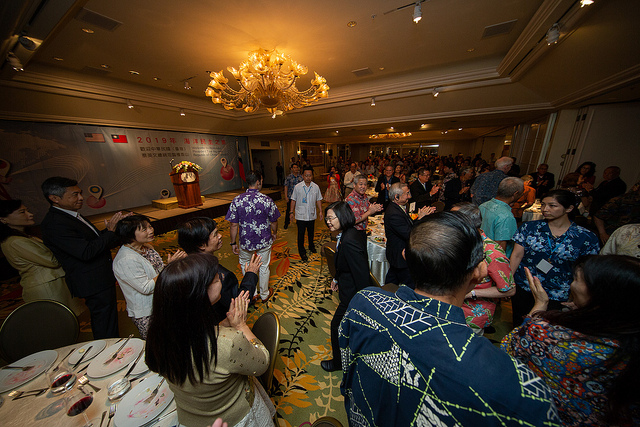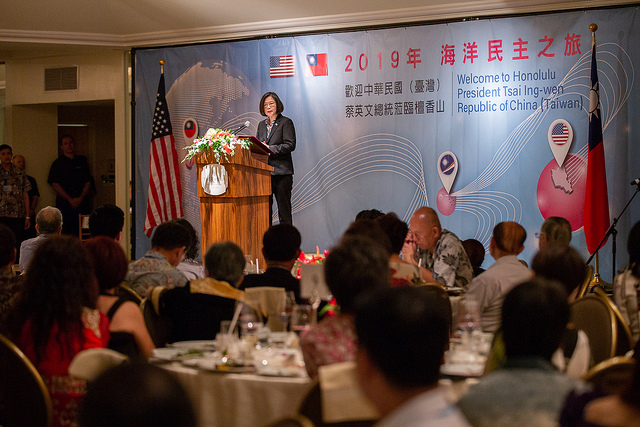News & activities
 News releases
News releases
President Tsai Ing-wen and her "Oceans of Democracy" delegation made a transit stop in Hawaii on their way back to Taiwan. After a flight time of four hours and 50 minutes, their aircraft arrived at the Honolulu International Airport on the afternoon of March 26 (morning of March 27 Taipei time). Taiwan's Representative to the United States Stanley Kao (高碩泰) and American Institute in Taiwan (AIT) Chairman James Moriarty boarded the plane to welcome the president, who subsequently proceeded to her hotel where she received an enthusiastic welcome from the overseas Taiwanese community.
President Tsai then attended a dinner banquet with Taiwanese expatriates in Hawaii. Her English remarks are as follows:
Chairman [James] Moriarty, House Speaker Scott Saiki, Senator Kalani English, Commissioner John Ho (何文祥), Senior Advisor Dr. Tai-Ying Yang (楊泰瑛), Major General Calvin Lau (劉啟運), President Joseph Hu (胡啟明), and many distinguished guests, ladies and gentlemen, good evening (respectively in Mandarin, Taiwanese, and Cantonese)! Aloha!
Thank you for the extraordinary welcome. It's been a while since I last visited in 2017, and it is good to be back. My delegation and I were so touched by your warm welcome at the airport. I want to thank each and every one of you, for coming here tonight to show your support. Thank you.
Tonight we are joined by Scott Saiki, Speaker of the Hawaii House of Representatives, and Hawaiian Senator Kalani English.
Not only have they both visited Taiwan in recent years, I just learned that Senator English studied in Taiwan in the 1980s. I hope you will find a time to visit Taiwan again in the future, to witness the development of our vibrant democracy and try some of our famed delicacies for yourself.
I also want to recognize our other important guests: Chairman Jim Moriarty of the American Institute in Taiwan, Ambassador Lauren Moriarty, and Ambassador Raymond Burghardt. Thank you all for coming.
This stop here in Hawaii marks the last leg of my visits to our allies in the Pacific. As you all know, we made visits to Palau, Nauru, and the Marshall Islands, so you could consider this trip somewhat of an Austronesian family reunion.
Also this year marks the 40th anniversary of the Taiwan Relations Act; there is no better time than now to celebrate our partnership. And over the past four decades, Taiwan and the US have together become a force for good in the world.
In fact, just earlier today, six Senators, both Republicans and Democrats, raised a new bill, the Taiwan Assurance Act, to support Taiwan’s defense, security, and international space. It emphasizes the strong partnership between our two countries.
And as long as we continue to stand up for our shared values and speak out for what is right - not just when it's easy, but also when it's hard - no one can take away our democracy.
So I want to thank our special guests for their support. Even though we are far from home, seeing so many people here has already made my delegation members and myself feel at home. And I trust that by the end of the banquet after a few glasses of wine, we'll be feeling even more like family.
Thank you all once again for coming today. I will now continue my remarks in Mandarin.
President Tsai began her Chinese remarks by stating that she was touched to return to Honolulu and see so many friends there to give her a warm welcome at a time when she most needed their support. She looked forward to everyone's continued hard work, and asked that they maintain their confidence in Taiwan.
Many people had high expectations of her when she first took office three years ago, the president said, and she had told everyone she would push for reforms. In truth, she said, all presidents say they want reforms, but no other president has pursued it with the same dogged determination she has shown.
The president further elaborated, saying that Taiwan desperately needed reforms of its pension system and social safety net, economic restructuring, and renewable energy, but previous administrations had shrunk from the task, either because they felt it was too difficult, or because they simply did not see the need. One the contrary, she said, she set right to work without wasting a minute's time.
She stated that many people used to think that relying on China was Taiwan's only way forward. Now, we are working to diversify our markets, and Taiwan's ranking has risen in many different economic performance indices. Some critics said that if mainland Chinese tourists stopped coming to Taiwan, our tourism industry would fail, but the number of foreign visitors has continued to grow in recent years. During her interview with CNN, President Tsai took the production team to Taipei's Ximending district so they could see for themselves what things look like with tourist arrivals at an all-time high.
In response to changes in the international sphere, the president pointed out, Taiwan has created a convenient one-stop contact window to attract mainland China-based Taiwanese businesses back to Taiwan. At this point, she said, 18 manufacturers have come back to set up production facilities in Taiwan, investing a combined total of NT$57 billion and creating over 7,700 job opportunities. And the Ministry of Economic Affairs has also stated that a number of mainland China-based Taiwanese businesses are currently waiting in line to return to Taiwan, and that they expect the scale of these investments to be massive.
The president stated that Taiwan's "5+2 industrial innovation program" has also begun steadily producing positive results over the past few years, and the machinery sector and the Internet of Things have both burgeoned into "trillion-NT-dollar industries" in Taiwan. Even our administration's national defense self-sufficiency initiative, which some observers were pessimistic about, has seen major breakthroughs thanks to efforts to build naval vessels and aircraft right here in Taiwan.
The term "22k monthly pay" once hung on the lips of young people throughout the country as a shorthand expression for worry over poor pay prospects, the president continued, but our administration has continued to look for ways to remedy this issue. As of this year, minimum wage has now reached NT$23,100 per month, and the "22k" term has passed into history.
The president expressed her understanding that most people care little about how economic development is achieved, as long as the economy improves, but she also expressed her belief that we have to take the right approach to this issue. Some in Taiwan wish to return to the days when we relied on China, she said, but she reminded everyone that if they compared the data, figures for economic growth, unemployment, and wages all show that today's Taiwan is absolutely doing better than it was when we relied on a single market.
Taiwanese companies are also building up their global presence, she said. In democratic countries, your friends are your real friends, and in our interactions with many democratic countries, almost no one has ever forced a political framework on us.
President Tsai emphasized that beyond our internal challenges, Taiwan is also subject to major external pressures. Earlier this year, China President Xi Jinping advocated for a "one country, two systems" model for Taiwan, and China is increasingly determined to force this model on us. Some Taiwanese expatriates have expressed their worries to her, but she asked that everyone rest assured, because as long as she is president, she said, she absolutely will defend Taiwan's national sovereignty, and we absolutely will not accept the "one country, two systems" model.
The president stated that on this trip she visited Palau, Nauru, and the Marshall Islands, three places that, like Taiwan, are "small countries with big resolve."
She further explained that Palau asks tourists to sign the Palau Pledge to preserve and protect the local environment. This sends a clear signal that the country seeks high-quality tourism and is willing to accept a decline in tourist arrivals to achieve it.
Nauru is one of the smallest countries in the world, she stated, but it stands tall and unafraid of threats or enticements from major powers. Nauru speaks up for Taiwan on the international stage, and its Parliament even passed a resolution declaring the country's firm support for Taiwan and rejecting China's "one country, two systems" model for Taiwan.
She also mentioned that the Marshall Islands consists of many coral atolls, so it bears the brunt of the effects of global climate change. At the Pacific Women Leaders' Coalition Conference in the Marshall Islands the day before, President Tsai witnessed their determination to create linkages worldwide in pursuit of environmental sustainability and gender equality.
In regard to observers' questions asking why Taiwan should maintain diplomatic relations with these countries, President Tsai suggested that such critics need to take a closer look. Our friends may be small, she said, but they are a match for any major power when it comes to their concern for and participation in international affairs, as well as their support for Taiwan.
The president stated that if small countries are important, then so are large countries, and Taiwan has made much progress in recent years in our relations with major powers. For example, Taiwan and the US have worked hard to keep our relationship moving in the right direction, in part thanks to the support of those present at the banquet. The United States has passed many laws supporting Taiwan, and the US government engages in substantive cooperation with us in many areas. Her very presence at this banquet, she said, and the fact that the journalists present were able to file news reports on the spot are concrete proof of the continual progress in Taiwan-US relations, she said.
She emphasized that Taiwan-US relations are progressing because the United States has confidence in Taiwan. They know that Taiwan will not engage in rash behavior due to international support, and we will not buckle under external pressure, because we are a reliable partner. As long as Taiwan is here, we will help protect the peace and stability of the Indo-Pacific region. Taiwan will most certainly make meaningful contributions in the Indo-Pacific region to democratic development, regional prosperity, and collective security, she said.
"Oceans of Democracy" was the theme of President Tsai's overseas trip. Oceans serve as a reminder of the region's great size, while democracy is the value that we treasure above all else. "Oceans" and "democracy," she said, are the most important aspects of the foundation that anchors Taiwan's place in the international community, and allows us to look out on the rest of the world.
Finally, the president emphasized her confidence in Taiwan, and urged everyone to share in that confidence as we continue to strive for the future of the next generation of Taiwanese people.
In his earlier remarks, Chairman Moriarty opened by expressing his delight at having the opportunity to welcome President Tsai to Hawaii. He recited a Chinese proverb: "It is always a pleasure to greet a friend from afar." In two weeks, he said, the US and Taiwan would be celebrating the 40th anniversary of the signing of the Taiwan Relations Act, and in the 40 years since, our countries have built a durable, comprehensive, mature relationship. Taiwan is now the United States' 11th largest trade partner, and plays an important role in the security of the Western Pacific. Taiwan has developed into a beacon of democracy, which shows that ethnic Chinese people can make democratic institutions work, he added. And Taiwan's transformation has solidified the foundation for our friendship with the United States, leading us to share the same interests and values. Chairman Moriarty closed by saying in Chinese: "Long live the friendship between the United States and Taiwan!"
Banquet attendees included: Foreign Minister Joseph Wu (吳釗燮), National Security Council Deputy Secretary-General Tsai Ming-yen (蔡明彥), Minister Wu Hsin-hsing (吳新興) of the Overseas Community Affairs Council (OCAC), Minister of Health and Welfare Chen Shih-chung (陳時中), Minister of the Council of Indigenous Peoples Icyang Parod (夷將‧拔路兒), Legislator Liu Chao-hao (劉櫂豪), Representative to the United States Stanley Kao, OCAC Commissioner John Ho, OCAC Senior Advisor Tai-Ying Yang, Major General Calvin Lau of the United Chinese Society of Hawaii, and President Joseph Hu of the Chinese Chamber of Commerce of Hawaii.












